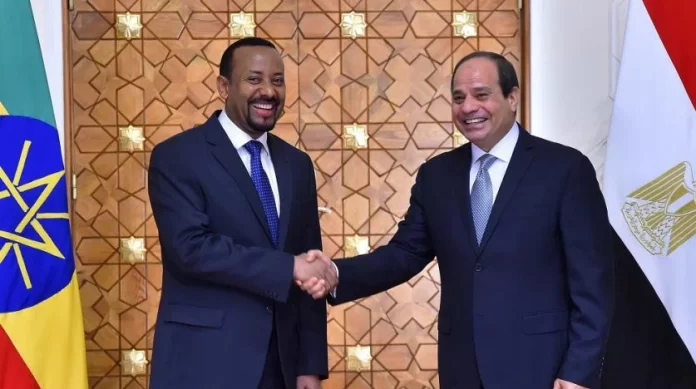Soon after Joe Biden won the presidency, Egypt’s ambassador to Washington called Ed Royce, a former congressman and partner at the US law firm Brownstein Hyatt Farber Schreck.
Simple enough: for an opulent $65k a month, Royce would lobby congress and the White House on Egypt’s behalf in Cairo’s efforts to stymie Ethiopia’s controversial Nile dam project.
Once filled, the Grand Ethiopian Renaissance Dam (GERD), which can contain quantities up to 74 square kilometres, will be Ethiopia’s largest water reservoir. On the Blue Nile, it is situated. Egypt, which has historically gained the most from the dam’s water yet is located thousands of kilometres downstream, is adamantly opposed to its construction. Cairo is concerned that the Nile’s waters, which are vital to its economy and statehood, would continue to decline.
Ethiopia declared the $5 billion GERD Dam was operational and that it would begin providing hydroelectricity to the country in February 2022. Cairo’s rage over this has increased, leading them to step up their diplomatic attempts to destroy the dam.
Royce, a former Californian representative to the House of Representatives who was dancing to Egypt’s tune, used his environmental expertise to inform members that the GERD Dam will significantly harm Egypt’s ecology and nearby ecosystems.
Ethiopia had previously retained Indiana legal firm Barnes & Thornburg for $130,000 per month in June 2020 to win the support of the then-Trump administration in the GERD Dam conflict, as if foretelling Egypt’s future actions.
Russia pins US on tenterhooks
The US is unsure of which tyrant to support in the end after being courted by both Egypt and Ethiopia in the fight over the GERD Dam.
Prior to the start of the Russia-Ukraine war, the choice appeared to be simple—at least on paper. Given that the US and Ethiopia had severed ties and that Ethiopia was facing increased sanctions as a result of its participation in the horrific civil war against Tigrayan rebels, it is likely that Biden would ultimately support Egypt in the GERD Dam dispute.
However, Russia’s incursion into Ukraine completely altered the plan for world diplomacy. The Biden administration is frantically trying to curry favour with the autocrats it has previously denounced, from Venezuela to Turkey, and entice them away from Russia.
Washington must perform a fine balancing act.
A bulwark against Islamist terrorism in the unrest-plagued Sinai Peninsula and a diplomatic ally in efforts to restore the intermittent Israeli-Palestinian peace pact, Abdel Fattah El-Sisi of Egypt has long served US interests in the area as a handy ruler.
Abiy Ahmed, Ethiopia’s prime minister and former war criminal accused of receiving the Nobel Peace Prize, is now also potentially helpful in order to avoid falling under the control of Russia and China.
Ethiopia shone as a solid US ally in the unstable Horn of Africa region before to Abiy’s destructive war against Tigray Province. Ethiopia wouldn’t think twice about sending its “peacekeeping” soldiers into Somalia, thereby stopping the Al Shabab terrorist group from gaining ground and endangering US interests.
The autocrats in Cairo and Addis Abeba are both aware of how desperate the US is for allies right now and are hopeful that Biden will support them in the future on the GERD crisis. No matter who the US ultimately supports, the dam might develop into a hazardous flashpoint for the area.
A dilemma for the US
The Russia-Ukraine conflict has caused the thin line between ally and foe to continuously shift in response to unfolding circumstances. According to reports, Sisi and Putin support strongman Khalifa Haftar in Libya against the UN-backed Tripoli government. The US seeks to sever Egypt’s ties to the Russian government.
Furthermore, it is difficult to locate a replacement market for the Russian wheat Egypt buys in large quantities. Egypt will be deeply aggrieved if the US supports Ethiopia in the GERD Dam conflict and enrages Sisi, and may even go to the Kremlin for assistance against Ethiopia.
Ethiopia, which invested billions in the dam and has its forces battling Al Shabab in neighbouring Somalia for years, won’t be able to forget the US snub if the opposite occurs and the US sides with Egypt in the dam conflict.
Furthermore, China, which has been awarded lucrative contracts to build the enormous dam, will expand its influence in Ethiopia. China already provides advanced Wing Loong armed drones to Ethiopia’s army for use in its campaign against the rebels in Tigray.
The US is split six ways to Sunday about which side to support in the GERD dam controversy. It is treading carefully so as not to have to choose a side, but it cannot continue to play this game.
BY: Deogracias Kalima
Deogracias Kalima is a freelance journalist with a special interest in the east of Africa affairs and science. His work appears in Africa Renewal, The Sisters Report, Earth Island Journal and China Dialogue.

